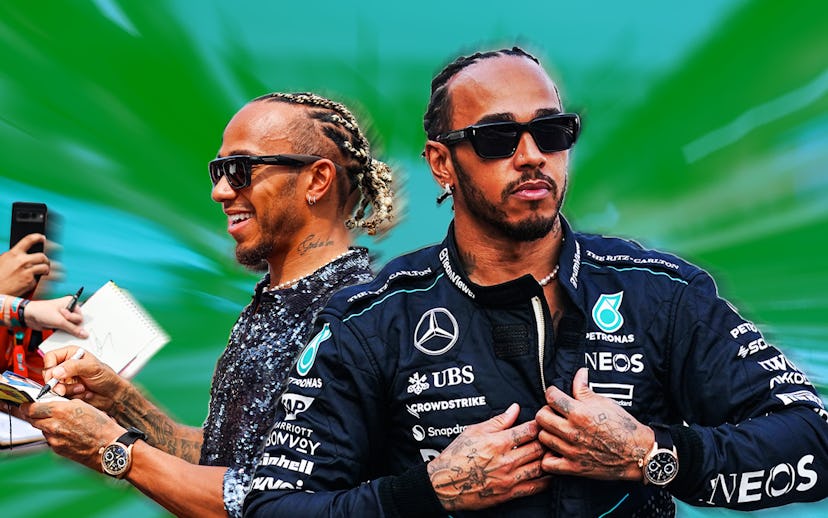
Formula 1
You Can’t Tell Me Lewis Hamilton Isn’t Bigger Than Formula 1
The 39-year-old British driver’s detractors say an athlete’s influence can’t transcend their sport. Team LH begs to differ.
When Who What Wear fashion editor Eliza Huber published a story about Formula 1 paddock fashion in February, she had no idea how much attention one of driver Alex Albon’s quotes would get: “He is just as [big], if not bigger than, the sport,” Albon said of Mercedes’ Lewis Hamilton. Almost immediately, his words erupted into fan discourse, with some fans arguing that athletes can’t be “bigger” than the sport they compete in.
“What made it feel so significant was that it came from someone Lewis competes against,” Huber tells NYLON. “Albon has no reason to praise Hamilton regarding his influence in and out of the sport. And yet, it rolled off his tongue, making me think that this is a regular opinion that people in the paddock have about him.”
Agree or disagree with Albon, one thing is clear: Hamilton has become synonymous with his sport over his 17-year-long career — and the British driver’s fanbase, Team LH, aren’t the only ones cosigning that message. For starters, Hamilton’s greatest-of-all-time status is in the books; he holds records for the most career wins, pole positions, podium finishes, career points, and laps led in driver history. (His seventh world title in 2020 tied him with the now-retired Hall of Fame driver Michael Schumacher.) But beyond that, his very presence speaks volumes — the 39-year-old remains the first and only Black driver in a predominantly white space, says Tasha James, the host of Quick Stop F1 and a vocal Team LH member. “[As Black people],” she says, “we always get the ‘Shut up and dribble’ type of rhetoric, but he transcends that.”
And though in the past few years Hamilton has gone from winning back-to-back championships to barely cracking the top three — a dry spell James says critics are using to discredit his previous accomplishments — he’s remained optimistic, which could be seen as part of his famously infectious personality that’s attracted A-list fans. David Beckham, Justin Bieber, Michelle Obama, and more have flocked to the Mercedes garage over the years. Serena Williams once made a detour to the 2021 Monaco Grand Prix to visit Hamilton ahead of the French Open. Shaquille O’Neal attended the 2023 Las Vegas Grand Prix and had only three words for the press: “Lewis Hamilton, baby.”
Hamilton’s character is what inspired Atlanta-based corporate recruiter Caryn Gordy-Scott to begin watching F1 in 2020. His candid chats on social media and outspoken nature on topics like representation and women’s rights appealed to her, but moments like when he took a knee during the Black Lives Matter protests ultimately converted Gordy-Scott into a Team LH member. “There’s a human element to Lewis that you don’t see from people of his caliber,” she says. “I don’t know him personally, but it’s clear he leads with empathy and understanding. You can tell he actually cares about people. Whenever people have negative things to say about Lewis, I roll my eyes.”
In contrast, James says it’s frustrating to see drivers and other figures in F1 not advocate or comment on social or political issues (or worse, add to them). “The discourse confirms that F1 is this bubble,” she says, “and many people refuse to ever see his contributions as anything significant or meaningful. They don’t see him as significant or meaningful, which doesn’t mesh with reality.”
“Whenever people have negative things to say about Lewis, I roll my eyes.”
If anything, perhaps the most accessible and undeniable evidence of the “Lewis Hamilton effect” is his status as a fashion darling. Non-F1 fans know him for his parade of head-turning paddock outfits and Met Gala appearances — where he’s uplifted Black creatives — as well as his brand-ambassador roles and collaborations with major names like Valentino. His strong personal style has even inspired the rest of the grid to participate. And despite the sport’s fashion-related crackdown, Hamilton “just shows up with his tattoos and piercings, and we haven’t really had anyone in sports be that way in this generation,” Gordy-Scott says, adding that she can’t imagine how hard it was for him to find his identity and express it “in the least diverse sport out there.” “He comes to the track every weekend, and he’s just himself.”
And for the next few years, we’ll continue to be privy to more unofficial “Lewis Hamilton Fashion Weeks” with his move from Mercedes to Ferrari, plus a record-breaking $100 million annual contract. But what will the sport look like once he eventually retires? His fans aren’t so sure. “I think F1 will have an issue once somebody as progressive as Lewis leaves,” James says. “He’s the only one who counterbalances the silence and complicity. F1 doesn’t have the infrastructure in place to keep that momentum going, even with so many opportunities to create goodwill amongst the fans.”
But while he’s still around, Hamilton remains humble and hungrier than ever and, with his achievements alone, ranks among the mythical tier of athletes like Serena Williams, Michael Jordan, and Kobe Bryant. And though his detractors might never say so, the thing about legends, Gordy-Scott says, is that you don’t appreciate them while they’re here: “And I think that’s exactly what’s happening with Lewis Hamilton.”